The Travel and Tourism Business Toolkit: Revenue, HR, and Law Report
VerifiedAdded on 2023/01/05
|14
|3549
|39
Report
AI Summary
This report, centered on the Travel and Tourism Business Toolkit, delves into crucial aspects of the industry. It begins by discussing the rationale and principles of revenue management, emphasizing its importance in maximizing profits through tools like pricing, inventory control, and marketing strategies. The report then explores the HR lifecycle, highlighting the significance of recruitment, training, motivation, and rewards for talent retention and development, followed by a performance management plan for a marketing manager. Furthermore, it examines specific legislations, including The Package Travel Regulations, Contract Act, Trade Descriptions Act, and Employment Rights Act, that organizations in the travel and tourism industry must adhere to, and the impact of company, employment, and contract law on business decision-making. The report also covers financial statements, reporting mechanisms, and the value of budgets for controlling business performance. The report uses TUI as an example for many of the concepts discussed.
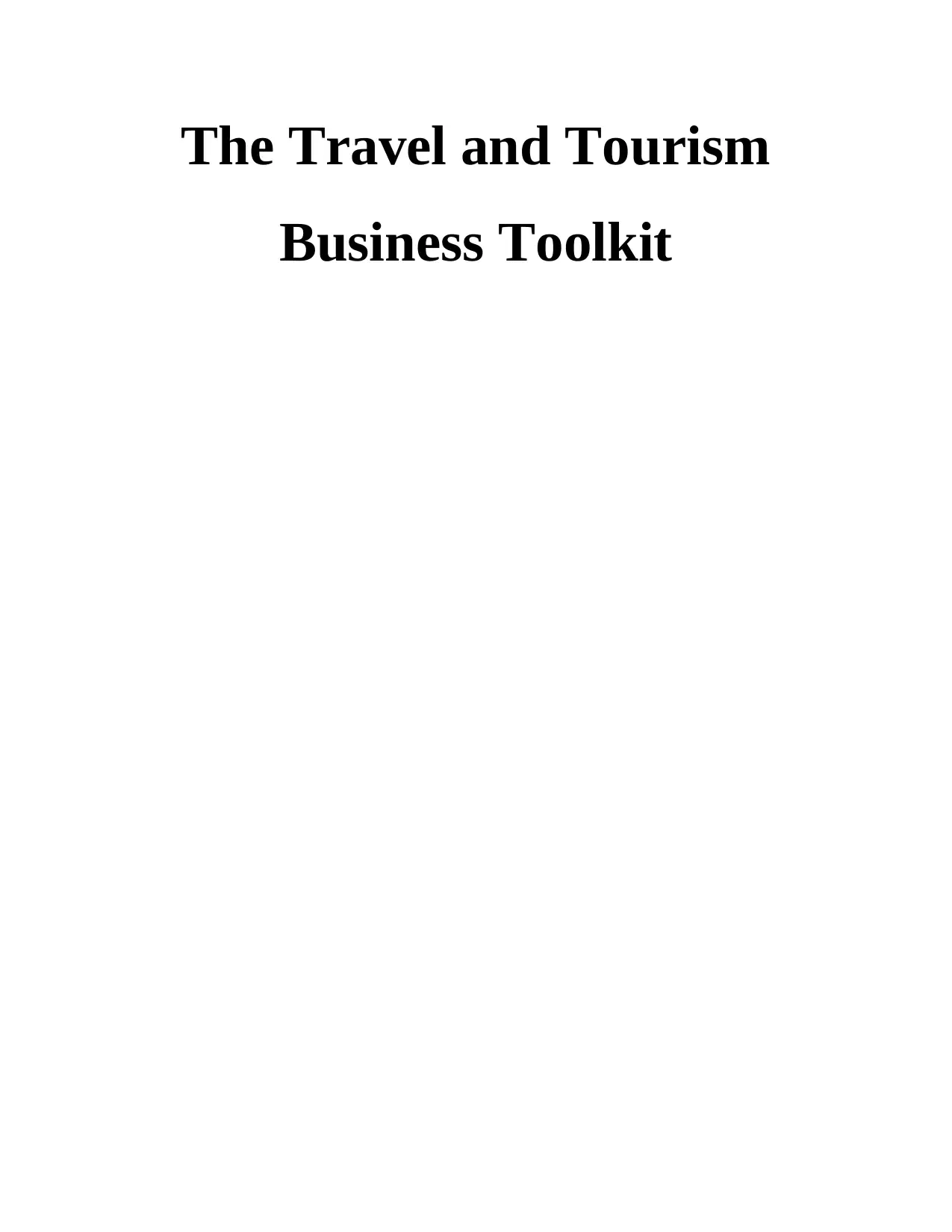
The Travel and Tourism
Business Toolkit
Business Toolkit
Paraphrase This Document
Need a fresh take? Get an instant paraphrase of this document with our AI Paraphraser
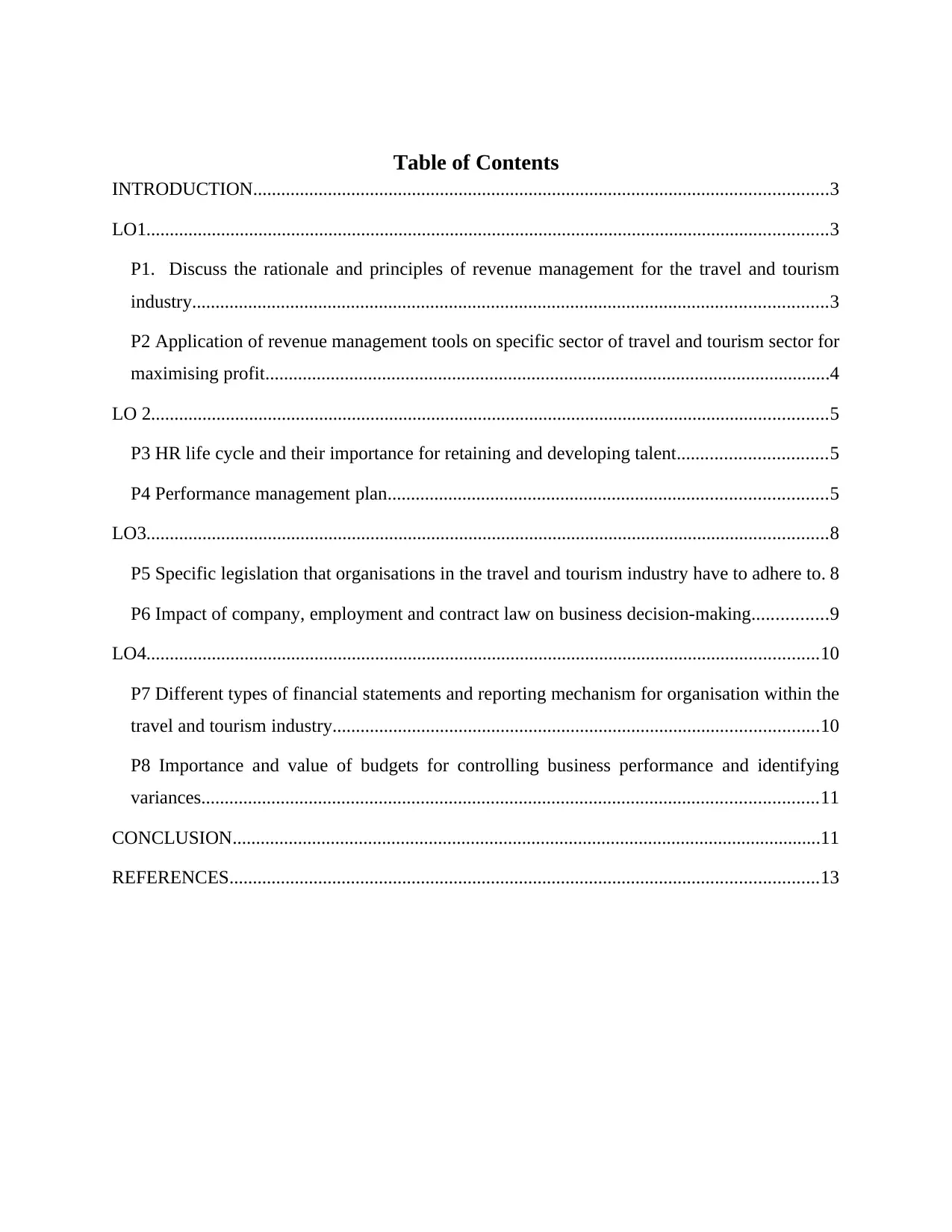
Table of Contents
INTRODUCTION...........................................................................................................................3
LO1..................................................................................................................................................3
P1. Discuss the rationale and principles of revenue management for the travel and tourism
industry........................................................................................................................................3
P2 Application of revenue management tools on specific sector of travel and tourism sector for
maximising profit.........................................................................................................................4
LO 2.................................................................................................................................................5
P3 HR life cycle and their importance for retaining and developing talent................................5
P4 Performance management plan..............................................................................................5
LO3..................................................................................................................................................8
P5 Specific legislation that organisations in the travel and tourism industry have to adhere to. 8
P6 Impact of company, employment and contract law on business decision-making................9
LO4................................................................................................................................................10
P7 Different types of financial statements and reporting mechanism for organisation within the
travel and tourism industry........................................................................................................10
P8 Importance and value of budgets for controlling business performance and identifying
variances....................................................................................................................................11
CONCLUSION..............................................................................................................................11
REFERENCES..............................................................................................................................13
INTRODUCTION...........................................................................................................................3
LO1..................................................................................................................................................3
P1. Discuss the rationale and principles of revenue management for the travel and tourism
industry........................................................................................................................................3
P2 Application of revenue management tools on specific sector of travel and tourism sector for
maximising profit.........................................................................................................................4
LO 2.................................................................................................................................................5
P3 HR life cycle and their importance for retaining and developing talent................................5
P4 Performance management plan..............................................................................................5
LO3..................................................................................................................................................8
P5 Specific legislation that organisations in the travel and tourism industry have to adhere to. 8
P6 Impact of company, employment and contract law on business decision-making................9
LO4................................................................................................................................................10
P7 Different types of financial statements and reporting mechanism for organisation within the
travel and tourism industry........................................................................................................10
P8 Importance and value of budgets for controlling business performance and identifying
variances....................................................................................................................................11
CONCLUSION..............................................................................................................................11
REFERENCES..............................................................................................................................13
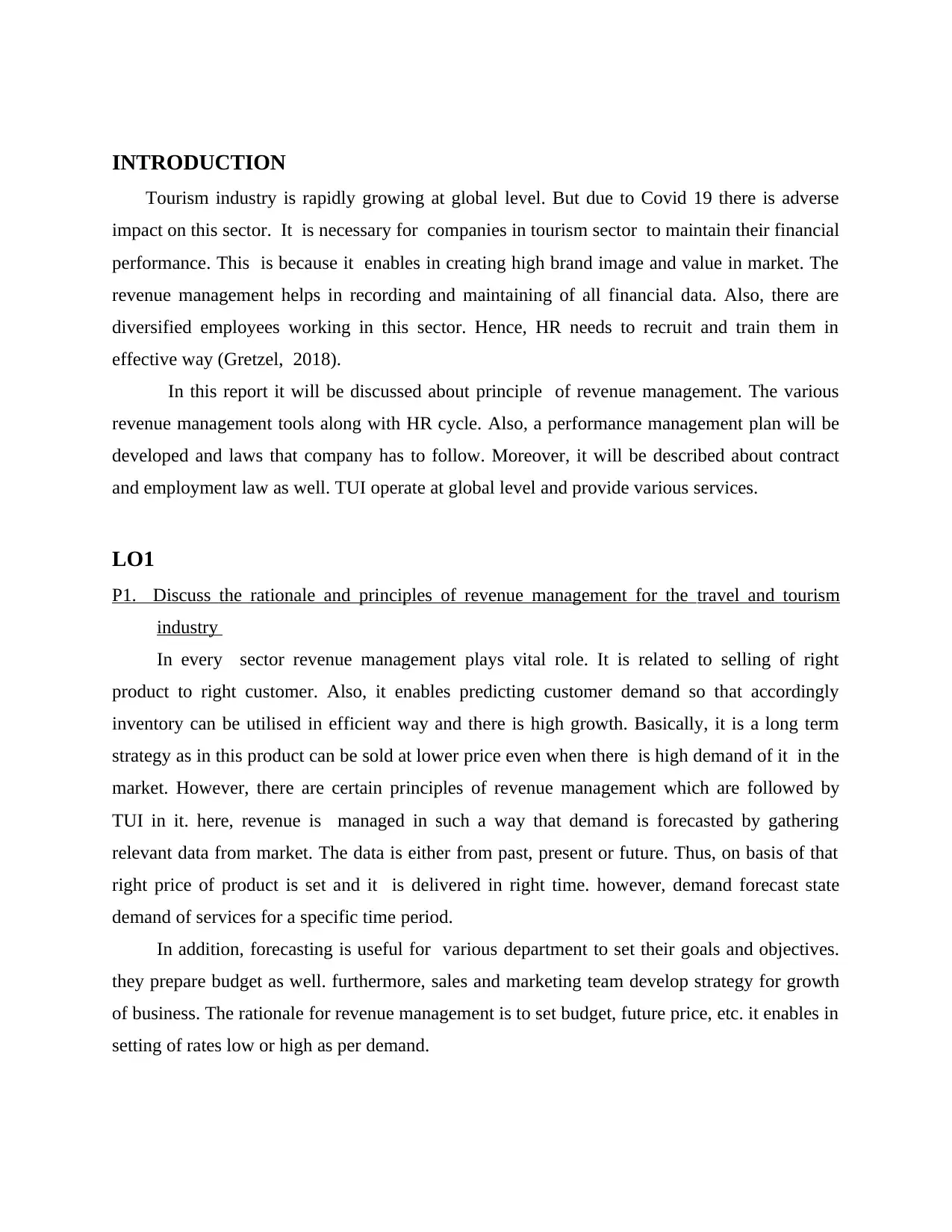
INTRODUCTION
Tourism industry is rapidly growing at global level. But due to Covid 19 there is adverse
impact on this sector. It is necessary for companies in tourism sector to maintain their financial
performance. This is because it enables in creating high brand image and value in market. The
revenue management helps in recording and maintaining of all financial data. Also, there are
diversified employees working in this sector. Hence, HR needs to recruit and train them in
effective way (Gretzel, 2018).
In this report it will be discussed about principle of revenue management. The various
revenue management tools along with HR cycle. Also, a performance management plan will be
developed and laws that company has to follow. Moreover, it will be described about contract
and employment law as well. TUI operate at global level and provide various services.
LO1
P1. Discuss the rationale and principles of revenue management for the travel and tourism
industry
In every sector revenue management plays vital role. It is related to selling of right
product to right customer. Also, it enables predicting customer demand so that accordingly
inventory can be utilised in efficient way and there is high growth. Basically, it is a long term
strategy as in this product can be sold at lower price even when there is high demand of it in the
market. However, there are certain principles of revenue management which are followed by
TUI in it. here, revenue is managed in such a way that demand is forecasted by gathering
relevant data from market. The data is either from past, present or future. Thus, on basis of that
right price of product is set and it is delivered in right time. however, demand forecast state
demand of services for a specific time period.
In addition, forecasting is useful for various department to set their goals and objectives.
they prepare budget as well. furthermore, sales and marketing team develop strategy for growth
of business. The rationale for revenue management is to set budget, future price, etc. it enables in
setting of rates low or high as per demand.
Tourism industry is rapidly growing at global level. But due to Covid 19 there is adverse
impact on this sector. It is necessary for companies in tourism sector to maintain their financial
performance. This is because it enables in creating high brand image and value in market. The
revenue management helps in recording and maintaining of all financial data. Also, there are
diversified employees working in this sector. Hence, HR needs to recruit and train them in
effective way (Gretzel, 2018).
In this report it will be discussed about principle of revenue management. The various
revenue management tools along with HR cycle. Also, a performance management plan will be
developed and laws that company has to follow. Moreover, it will be described about contract
and employment law as well. TUI operate at global level and provide various services.
LO1
P1. Discuss the rationale and principles of revenue management for the travel and tourism
industry
In every sector revenue management plays vital role. It is related to selling of right
product to right customer. Also, it enables predicting customer demand so that accordingly
inventory can be utilised in efficient way and there is high growth. Basically, it is a long term
strategy as in this product can be sold at lower price even when there is high demand of it in the
market. However, there are certain principles of revenue management which are followed by
TUI in it. here, revenue is managed in such a way that demand is forecasted by gathering
relevant data from market. The data is either from past, present or future. Thus, on basis of that
right price of product is set and it is delivered in right time. however, demand forecast state
demand of services for a specific time period.
In addition, forecasting is useful for various department to set their goals and objectives.
they prepare budget as well. furthermore, sales and marketing team develop strategy for growth
of business. The rationale for revenue management is to set budget, future price, etc. it enables in
setting of rates low or high as per demand.
⊘ This is a preview!⊘
Do you want full access?
Subscribe today to unlock all pages.

Trusted by 1+ million students worldwide
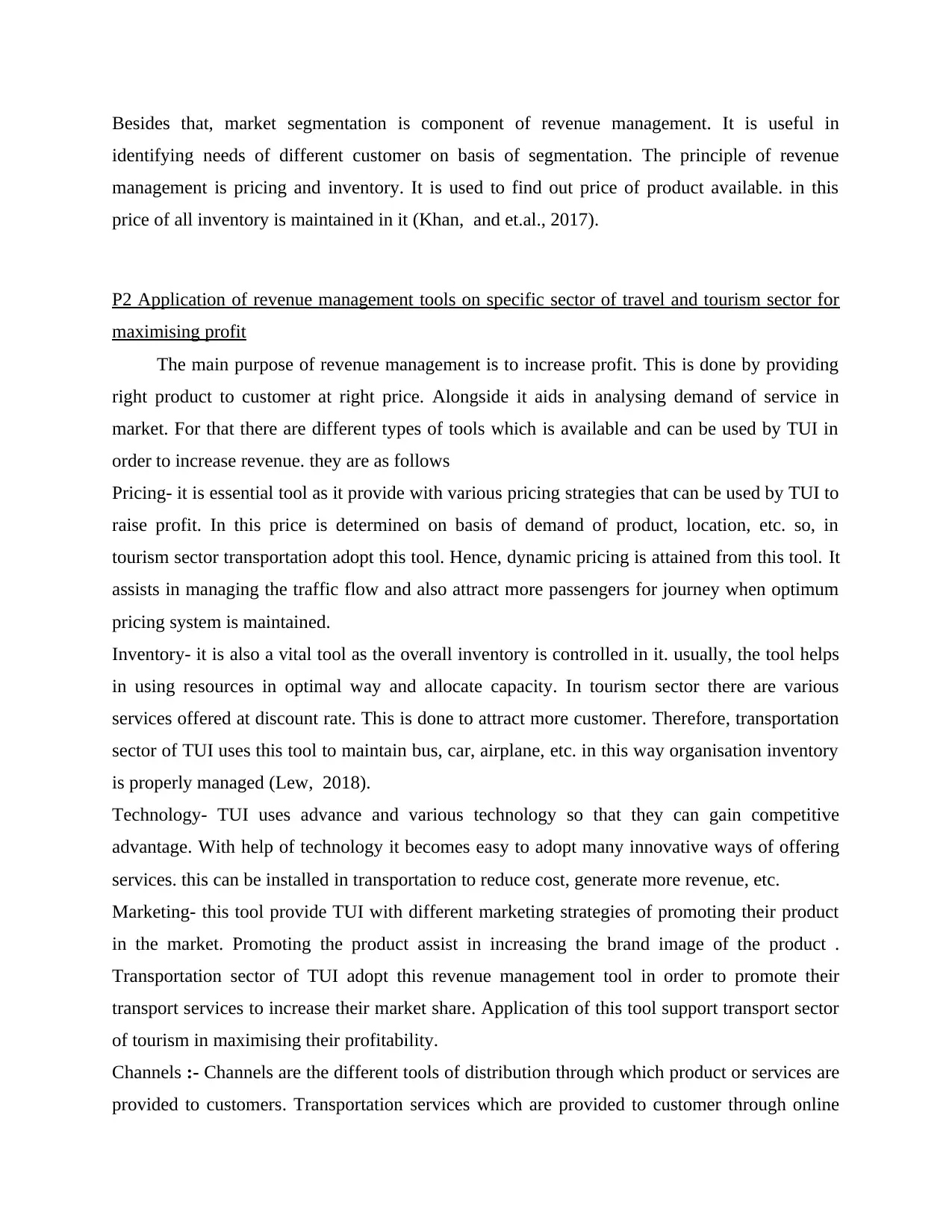
Besides that, market segmentation is component of revenue management. It is useful in
identifying needs of different customer on basis of segmentation. The principle of revenue
management is pricing and inventory. It is used to find out price of product available. in this
price of all inventory is maintained in it (Khan, and et.al., 2017).
P2 Application of revenue management tools on specific sector of travel and tourism sector for
maximising profit
The main purpose of revenue management is to increase profit. This is done by providing
right product to customer at right price. Alongside it aids in analysing demand of service in
market. For that there are different types of tools which is available and can be used by TUI in
order to increase revenue. they are as follows
Pricing- it is essential tool as it provide with various pricing strategies that can be used by TUI to
raise profit. In this price is determined on basis of demand of product, location, etc. so, in
tourism sector transportation adopt this tool. Hence, dynamic pricing is attained from this tool. It
assists in managing the traffic flow and also attract more passengers for journey when optimum
pricing system is maintained.
Inventory- it is also a vital tool as the overall inventory is controlled in it. usually, the tool helps
in using resources in optimal way and allocate capacity. In tourism sector there are various
services offered at discount rate. This is done to attract more customer. Therefore, transportation
sector of TUI uses this tool to maintain bus, car, airplane, etc. in this way organisation inventory
is properly managed (Lew, 2018).
Technology- TUI uses advance and various technology so that they can gain competitive
advantage. With help of technology it becomes easy to adopt many innovative ways of offering
services. this can be installed in transportation to reduce cost, generate more revenue, etc.
Marketing- this tool provide TUI with different marketing strategies of promoting their product
in the market. Promoting the product assist in increasing the brand image of the product .
Transportation sector of TUI adopt this revenue management tool in order to promote their
transport services to increase their market share. Application of this tool support transport sector
of tourism in maximising their profitability.
Channels :- Channels are the different tools of distribution through which product or services are
provided to customers. Transportation services which are provided to customer through online
identifying needs of different customer on basis of segmentation. The principle of revenue
management is pricing and inventory. It is used to find out price of product available. in this
price of all inventory is maintained in it (Khan, and et.al., 2017).
P2 Application of revenue management tools on specific sector of travel and tourism sector for
maximising profit
The main purpose of revenue management is to increase profit. This is done by providing
right product to customer at right price. Alongside it aids in analysing demand of service in
market. For that there are different types of tools which is available and can be used by TUI in
order to increase revenue. they are as follows
Pricing- it is essential tool as it provide with various pricing strategies that can be used by TUI to
raise profit. In this price is determined on basis of demand of product, location, etc. so, in
tourism sector transportation adopt this tool. Hence, dynamic pricing is attained from this tool. It
assists in managing the traffic flow and also attract more passengers for journey when optimum
pricing system is maintained.
Inventory- it is also a vital tool as the overall inventory is controlled in it. usually, the tool helps
in using resources in optimal way and allocate capacity. In tourism sector there are various
services offered at discount rate. This is done to attract more customer. Therefore, transportation
sector of TUI uses this tool to maintain bus, car, airplane, etc. in this way organisation inventory
is properly managed (Lew, 2018).
Technology- TUI uses advance and various technology so that they can gain competitive
advantage. With help of technology it becomes easy to adopt many innovative ways of offering
services. this can be installed in transportation to reduce cost, generate more revenue, etc.
Marketing- this tool provide TUI with different marketing strategies of promoting their product
in the market. Promoting the product assist in increasing the brand image of the product .
Transportation sector of TUI adopt this revenue management tool in order to promote their
transport services to increase their market share. Application of this tool support transport sector
of tourism in maximising their profitability.
Channels :- Channels are the different tools of distribution through which product or services are
provided to customers. Transportation services which are provided to customer through online
Paraphrase This Document
Need a fresh take? Get an instant paraphrase of this document with our AI Paraphraser
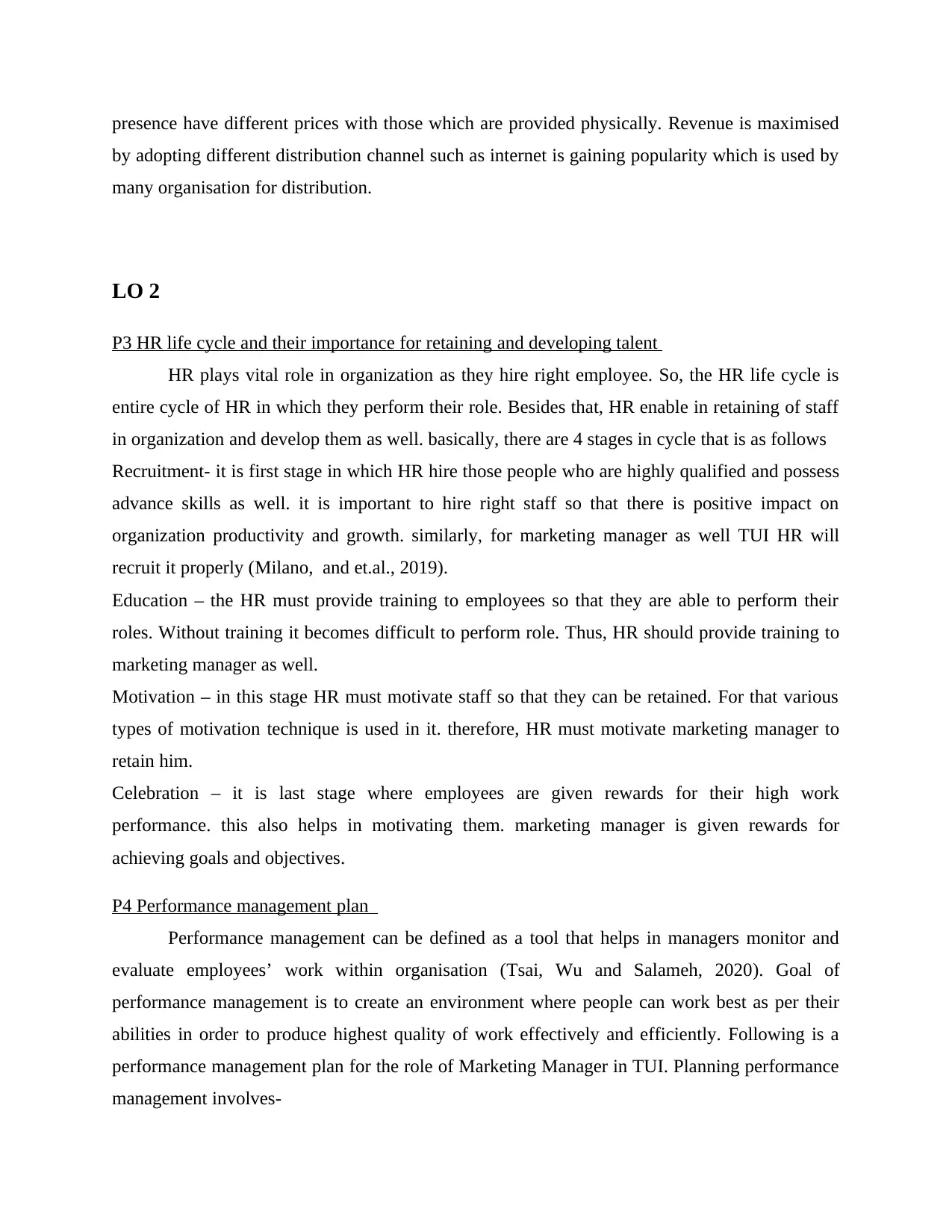
presence have different prices with those which are provided physically. Revenue is maximised
by adopting different distribution channel such as internet is gaining popularity which is used by
many organisation for distribution.
LO 2
P3 HR life cycle and their importance for retaining and developing talent
HR plays vital role in organization as they hire right employee. So, the HR life cycle is
entire cycle of HR in which they perform their role. Besides that, HR enable in retaining of staff
in organization and develop them as well. basically, there are 4 stages in cycle that is as follows
Recruitment- it is first stage in which HR hire those people who are highly qualified and possess
advance skills as well. it is important to hire right staff so that there is positive impact on
organization productivity and growth. similarly, for marketing manager as well TUI HR will
recruit it properly (Milano, and et.al., 2019).
Education – the HR must provide training to employees so that they are able to perform their
roles. Without training it becomes difficult to perform role. Thus, HR should provide training to
marketing manager as well.
Motivation – in this stage HR must motivate staff so that they can be retained. For that various
types of motivation technique is used in it. therefore, HR must motivate marketing manager to
retain him.
Celebration – it is last stage where employees are given rewards for their high work
performance. this also helps in motivating them. marketing manager is given rewards for
achieving goals and objectives.
P4 Performance management plan
Performance management can be defined as a tool that helps in managers monitor and
evaluate employees’ work within organisation (Tsai, Wu and Salameh, 2020). Goal of
performance management is to create an environment where people can work best as per their
abilities in order to produce highest quality of work effectively and efficiently. Following is a
performance management plan for the role of Marketing Manager in TUI. Planning performance
management involves-
by adopting different distribution channel such as internet is gaining popularity which is used by
many organisation for distribution.
LO 2
P3 HR life cycle and their importance for retaining and developing talent
HR plays vital role in organization as they hire right employee. So, the HR life cycle is
entire cycle of HR in which they perform their role. Besides that, HR enable in retaining of staff
in organization and develop them as well. basically, there are 4 stages in cycle that is as follows
Recruitment- it is first stage in which HR hire those people who are highly qualified and possess
advance skills as well. it is important to hire right staff so that there is positive impact on
organization productivity and growth. similarly, for marketing manager as well TUI HR will
recruit it properly (Milano, and et.al., 2019).
Education – the HR must provide training to employees so that they are able to perform their
roles. Without training it becomes difficult to perform role. Thus, HR should provide training to
marketing manager as well.
Motivation – in this stage HR must motivate staff so that they can be retained. For that various
types of motivation technique is used in it. therefore, HR must motivate marketing manager to
retain him.
Celebration – it is last stage where employees are given rewards for their high work
performance. this also helps in motivating them. marketing manager is given rewards for
achieving goals and objectives.
P4 Performance management plan
Performance management can be defined as a tool that helps in managers monitor and
evaluate employees’ work within organisation (Tsai, Wu and Salameh, 2020). Goal of
performance management is to create an environment where people can work best as per their
abilities in order to produce highest quality of work effectively and efficiently. Following is a
performance management plan for the role of Marketing Manager in TUI. Planning performance
management involves-
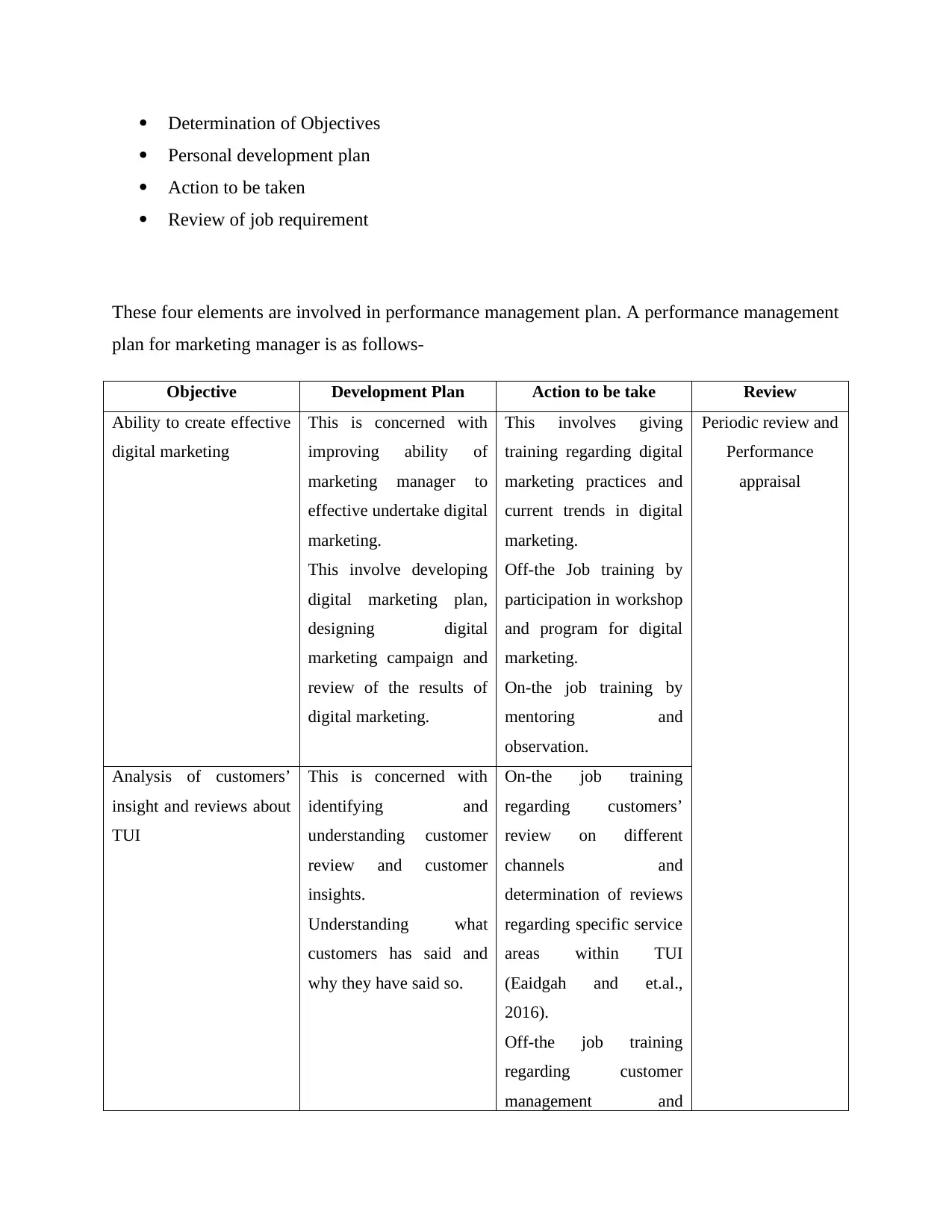
Determination of Objectives
Personal development plan
Action to be taken
Review of job requirement
These four elements are involved in performance management plan. A performance management
plan for marketing manager is as follows-
Objective Development Plan Action to be take Review
Ability to create effective
digital marketing
This is concerned with
improving ability of
marketing manager to
effective undertake digital
marketing.
This involve developing
digital marketing plan,
designing digital
marketing campaign and
review of the results of
digital marketing.
This involves giving
training regarding digital
marketing practices and
current trends in digital
marketing.
Off-the Job training by
participation in workshop
and program for digital
marketing.
On-the job training by
mentoring and
observation.
Periodic review and
Performance
appraisal
Analysis of customers’
insight and reviews about
TUI
This is concerned with
identifying and
understanding customer
review and customer
insights.
Understanding what
customers has said and
why they have said so.
On-the job training
regarding customers’
review on different
channels and
determination of reviews
regarding specific service
areas within TUI
(Eaidgah and et.al.,
2016).
Off-the job training
regarding customer
management and
Personal development plan
Action to be taken
Review of job requirement
These four elements are involved in performance management plan. A performance management
plan for marketing manager is as follows-
Objective Development Plan Action to be take Review
Ability to create effective
digital marketing
This is concerned with
improving ability of
marketing manager to
effective undertake digital
marketing.
This involve developing
digital marketing plan,
designing digital
marketing campaign and
review of the results of
digital marketing.
This involves giving
training regarding digital
marketing practices and
current trends in digital
marketing.
Off-the Job training by
participation in workshop
and program for digital
marketing.
On-the job training by
mentoring and
observation.
Periodic review and
Performance
appraisal
Analysis of customers’
insight and reviews about
TUI
This is concerned with
identifying and
understanding customer
review and customer
insights.
Understanding what
customers has said and
why they have said so.
On-the job training
regarding customers’
review on different
channels and
determination of reviews
regarding specific service
areas within TUI
(Eaidgah and et.al.,
2016).
Off-the job training
regarding customer
management and
⊘ This is a preview!⊘
Do you want full access?
Subscribe today to unlock all pages.

Trusted by 1+ million students worldwide
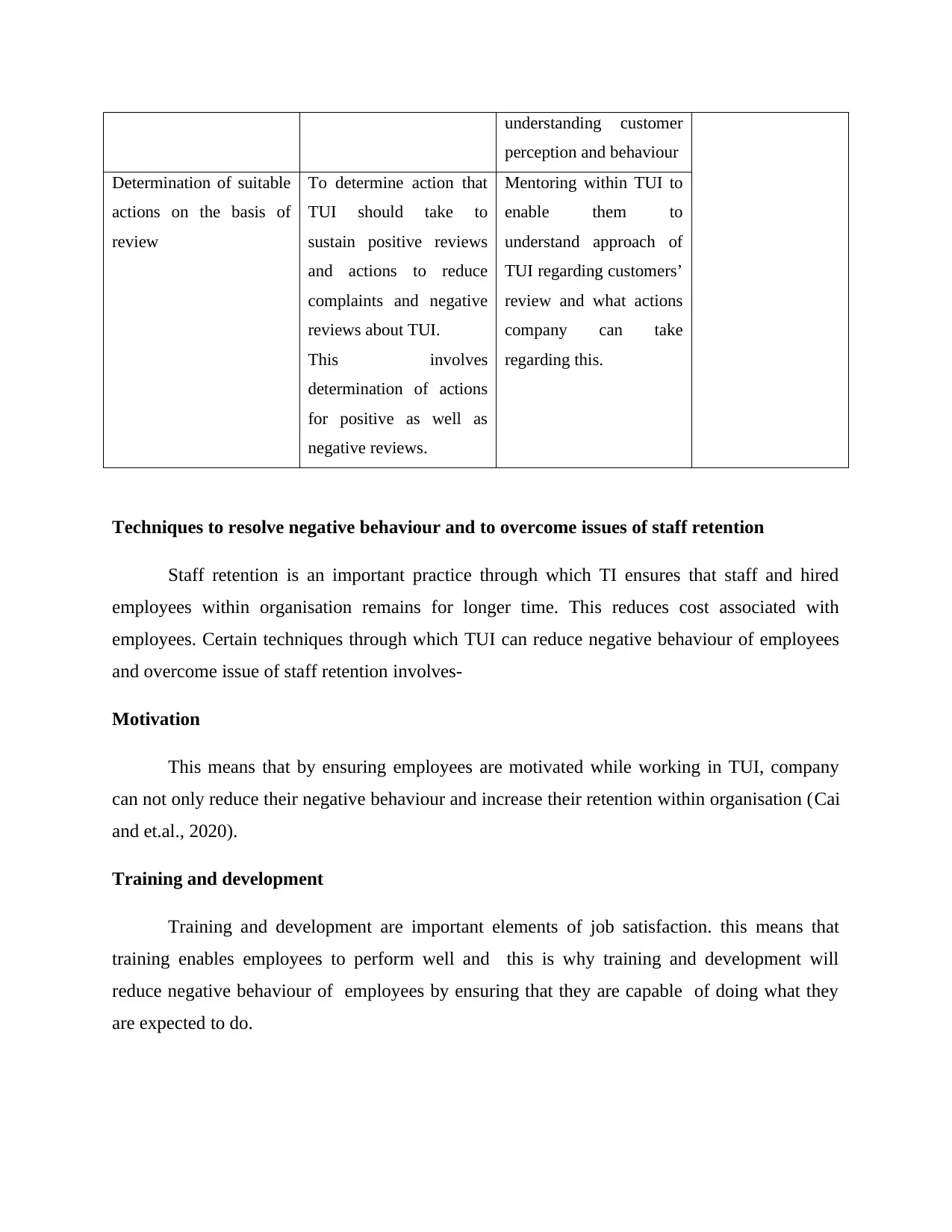
understanding customer
perception and behaviour
Determination of suitable
actions on the basis of
review
To determine action that
TUI should take to
sustain positive reviews
and actions to reduce
complaints and negative
reviews about TUI.
This involves
determination of actions
for positive as well as
negative reviews.
Mentoring within TUI to
enable them to
understand approach of
TUI regarding customers’
review and what actions
company can take
regarding this.
Techniques to resolve negative behaviour and to overcome issues of staff retention
Staff retention is an important practice through which TI ensures that staff and hired
employees within organisation remains for longer time. This reduces cost associated with
employees. Certain techniques through which TUI can reduce negative behaviour of employees
and overcome issue of staff retention involves-
Motivation
This means that by ensuring employees are motivated while working in TUI, company
can not only reduce their negative behaviour and increase their retention within organisation (Cai
and et.al., 2020).
Training and development
Training and development are important elements of job satisfaction. this means that
training enables employees to perform well and this is why training and development will
reduce negative behaviour of employees by ensuring that they are capable of doing what they
are expected to do.
perception and behaviour
Determination of suitable
actions on the basis of
review
To determine action that
TUI should take to
sustain positive reviews
and actions to reduce
complaints and negative
reviews about TUI.
This involves
determination of actions
for positive as well as
negative reviews.
Mentoring within TUI to
enable them to
understand approach of
TUI regarding customers’
review and what actions
company can take
regarding this.
Techniques to resolve negative behaviour and to overcome issues of staff retention
Staff retention is an important practice through which TI ensures that staff and hired
employees within organisation remains for longer time. This reduces cost associated with
employees. Certain techniques through which TUI can reduce negative behaviour of employees
and overcome issue of staff retention involves-
Motivation
This means that by ensuring employees are motivated while working in TUI, company
can not only reduce their negative behaviour and increase their retention within organisation (Cai
and et.al., 2020).
Training and development
Training and development are important elements of job satisfaction. this means that
training enables employees to perform well and this is why training and development will
reduce negative behaviour of employees by ensuring that they are capable of doing what they
are expected to do.
Paraphrase This Document
Need a fresh take? Get an instant paraphrase of this document with our AI Paraphraser
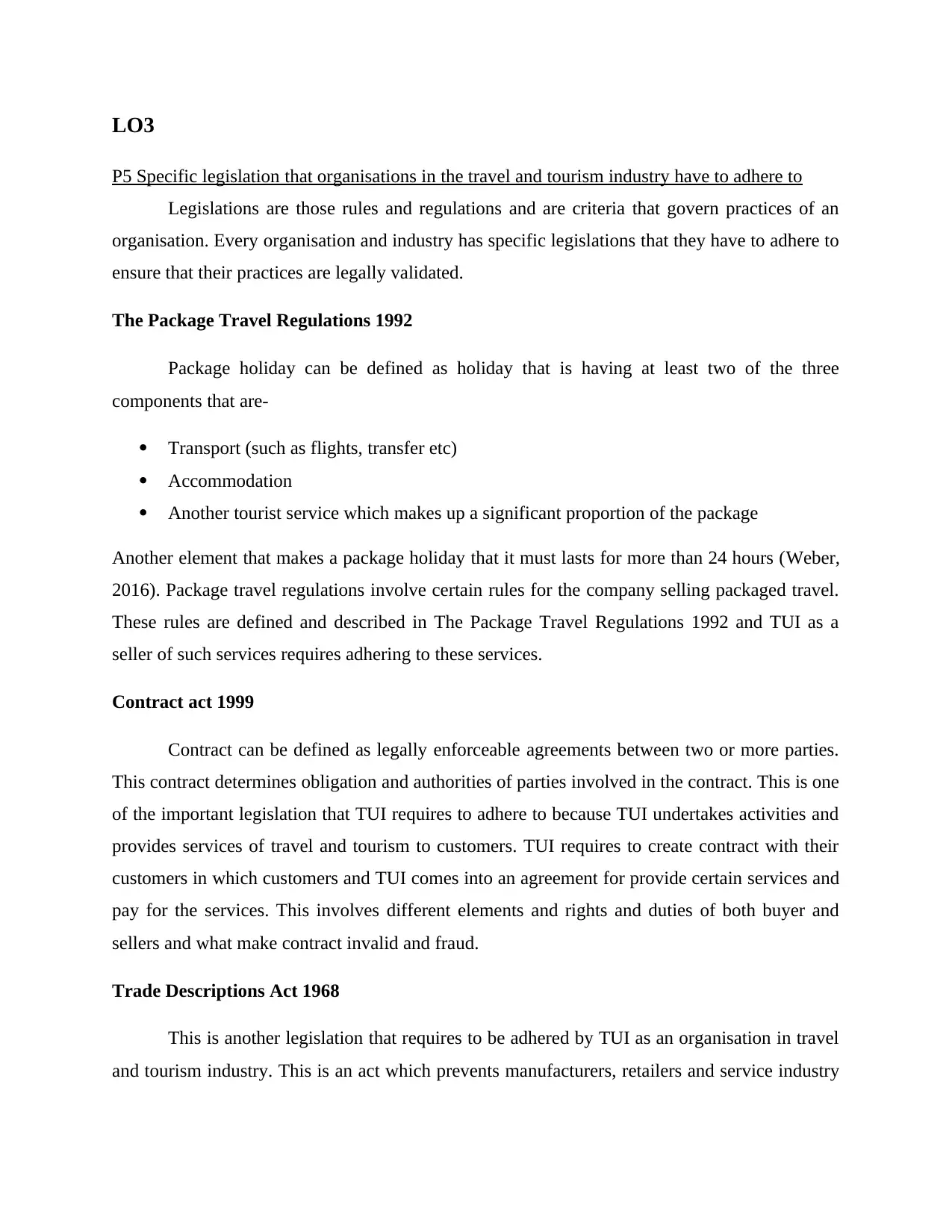
LO3
P5 Specific legislation that organisations in the travel and tourism industry have to adhere to
Legislations are those rules and regulations and are criteria that govern practices of an
organisation. Every organisation and industry has specific legislations that they have to adhere to
ensure that their practices are legally validated.
The Package Travel Regulations 1992
Package holiday can be defined as holiday that is having at least two of the three
components that are-
Transport (such as flights, transfer etc)
Accommodation
Another tourist service which makes up a significant proportion of the package
Another element that makes a package holiday that it must lasts for more than 24 hours (Weber,
2016). Package travel regulations involve certain rules for the company selling packaged travel.
These rules are defined and described in The Package Travel Regulations 1992 and TUI as a
seller of such services requires adhering to these services.
Contract act 1999
Contract can be defined as legally enforceable agreements between two or more parties.
This contract determines obligation and authorities of parties involved in the contract. This is one
of the important legislation that TUI requires to adhere to because TUI undertakes activities and
provides services of travel and tourism to customers. TUI requires to create contract with their
customers in which customers and TUI comes into an agreement for provide certain services and
pay for the services. This involves different elements and rights and duties of both buyer and
sellers and what make contract invalid and fraud.
Trade Descriptions Act 1968
This is another legislation that requires to be adhered by TUI as an organisation in travel
and tourism industry. This is an act which prevents manufacturers, retailers and service industry
P5 Specific legislation that organisations in the travel and tourism industry have to adhere to
Legislations are those rules and regulations and are criteria that govern practices of an
organisation. Every organisation and industry has specific legislations that they have to adhere to
ensure that their practices are legally validated.
The Package Travel Regulations 1992
Package holiday can be defined as holiday that is having at least two of the three
components that are-
Transport (such as flights, transfer etc)
Accommodation
Another tourist service which makes up a significant proportion of the package
Another element that makes a package holiday that it must lasts for more than 24 hours (Weber,
2016). Package travel regulations involve certain rules for the company selling packaged travel.
These rules are defined and described in The Package Travel Regulations 1992 and TUI as a
seller of such services requires adhering to these services.
Contract act 1999
Contract can be defined as legally enforceable agreements between two or more parties.
This contract determines obligation and authorities of parties involved in the contract. This is one
of the important legislation that TUI requires to adhere to because TUI undertakes activities and
provides services of travel and tourism to customers. TUI requires to create contract with their
customers in which customers and TUI comes into an agreement for provide certain services and
pay for the services. This involves different elements and rights and duties of both buyer and
sellers and what make contract invalid and fraud.
Trade Descriptions Act 1968
This is another legislation that requires to be adhered by TUI as an organisation in travel
and tourism industry. This is an act which prevents manufacturers, retailers and service industry
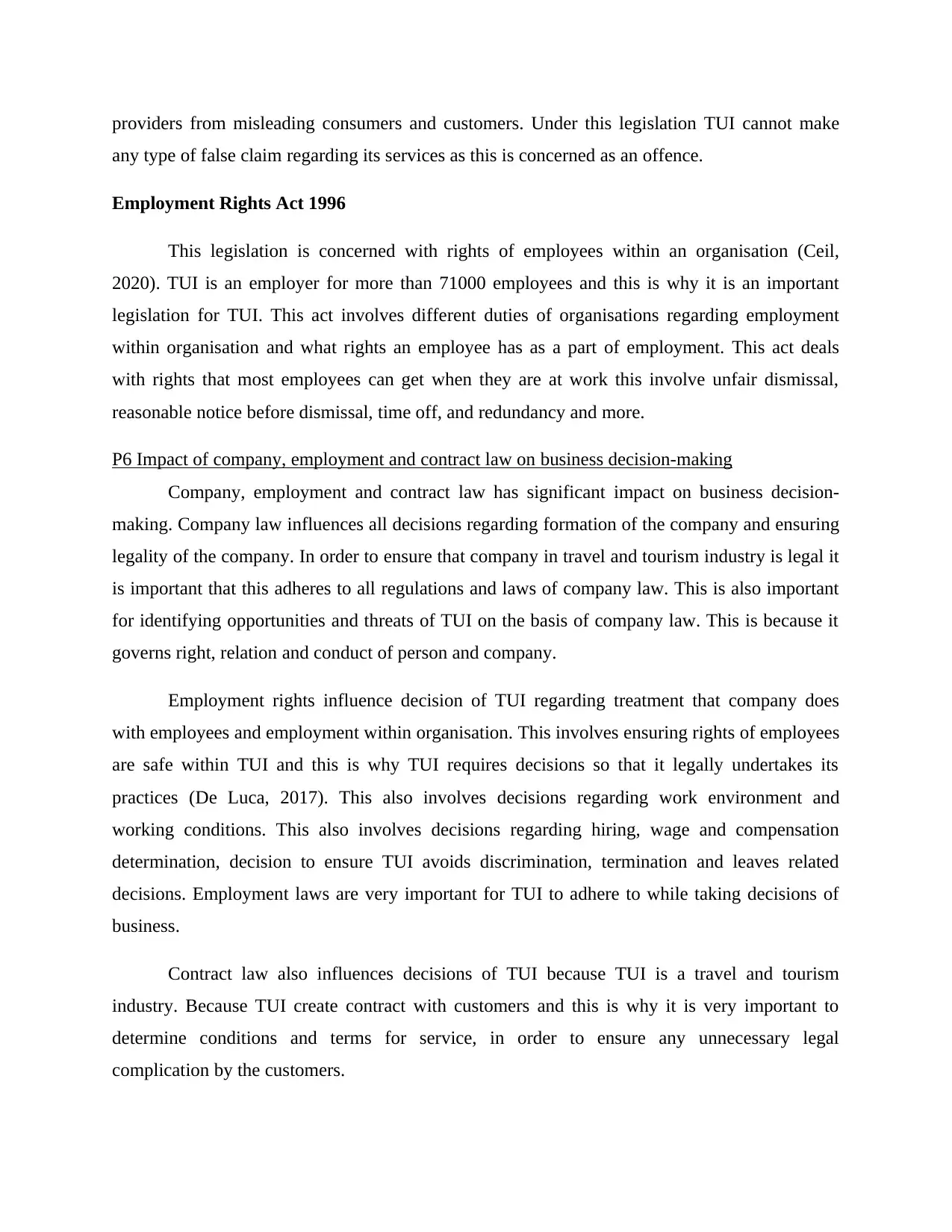
providers from misleading consumers and customers. Under this legislation TUI cannot make
any type of false claim regarding its services as this is concerned as an offence.
Employment Rights Act 1996
This legislation is concerned with rights of employees within an organisation (Ceil,
2020). TUI is an employer for more than 71000 employees and this is why it is an important
legislation for TUI. This act involves different duties of organisations regarding employment
within organisation and what rights an employee has as a part of employment. This act deals
with rights that most employees can get when they are at work this involve unfair dismissal,
reasonable notice before dismissal, time off, and redundancy and more.
P6 Impact of company, employment and contract law on business decision-making
Company, employment and contract law has significant impact on business decision-
making. Company law influences all decisions regarding formation of the company and ensuring
legality of the company. In order to ensure that company in travel and tourism industry is legal it
is important that this adheres to all regulations and laws of company law. This is also important
for identifying opportunities and threats of TUI on the basis of company law. This is because it
governs right, relation and conduct of person and company.
Employment rights influence decision of TUI regarding treatment that company does
with employees and employment within organisation. This involves ensuring rights of employees
are safe within TUI and this is why TUI requires decisions so that it legally undertakes its
practices (De Luca, 2017). This also involves decisions regarding work environment and
working conditions. This also involves decisions regarding hiring, wage and compensation
determination, decision to ensure TUI avoids discrimination, termination and leaves related
decisions. Employment laws are very important for TUI to adhere to while taking decisions of
business.
Contract law also influences decisions of TUI because TUI is a travel and tourism
industry. Because TUI create contract with customers and this is why it is very important to
determine conditions and terms for service, in order to ensure any unnecessary legal
complication by the customers.
any type of false claim regarding its services as this is concerned as an offence.
Employment Rights Act 1996
This legislation is concerned with rights of employees within an organisation (Ceil,
2020). TUI is an employer for more than 71000 employees and this is why it is an important
legislation for TUI. This act involves different duties of organisations regarding employment
within organisation and what rights an employee has as a part of employment. This act deals
with rights that most employees can get when they are at work this involve unfair dismissal,
reasonable notice before dismissal, time off, and redundancy and more.
P6 Impact of company, employment and contract law on business decision-making
Company, employment and contract law has significant impact on business decision-
making. Company law influences all decisions regarding formation of the company and ensuring
legality of the company. In order to ensure that company in travel and tourism industry is legal it
is important that this adheres to all regulations and laws of company law. This is also important
for identifying opportunities and threats of TUI on the basis of company law. This is because it
governs right, relation and conduct of person and company.
Employment rights influence decision of TUI regarding treatment that company does
with employees and employment within organisation. This involves ensuring rights of employees
are safe within TUI and this is why TUI requires decisions so that it legally undertakes its
practices (De Luca, 2017). This also involves decisions regarding work environment and
working conditions. This also involves decisions regarding hiring, wage and compensation
determination, decision to ensure TUI avoids discrimination, termination and leaves related
decisions. Employment laws are very important for TUI to adhere to while taking decisions of
business.
Contract law also influences decisions of TUI because TUI is a travel and tourism
industry. Because TUI create contract with customers and this is why it is very important to
determine conditions and terms for service, in order to ensure any unnecessary legal
complication by the customers.
⊘ This is a preview!⊘
Do you want full access?
Subscribe today to unlock all pages.

Trusted by 1+ million students worldwide
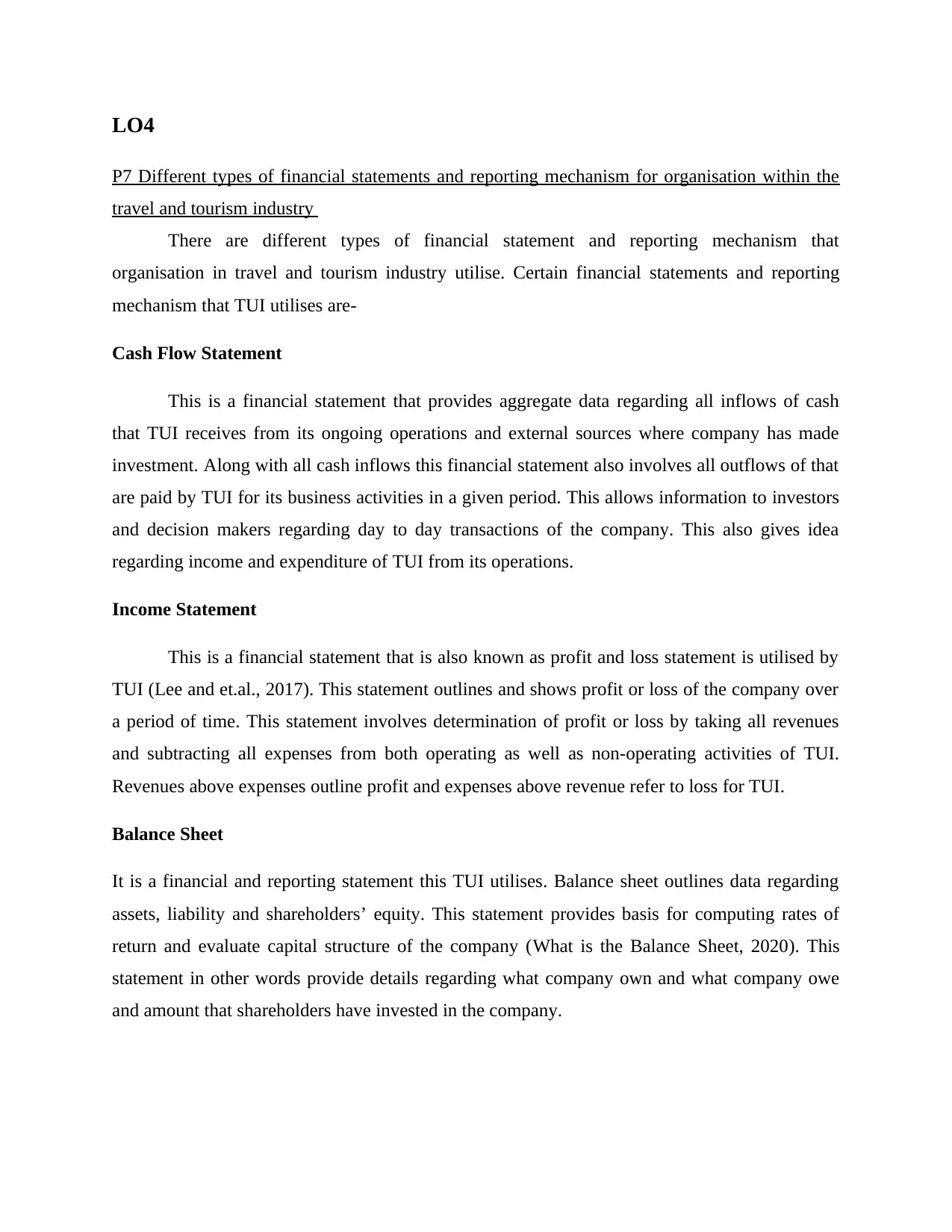
LO4
P7 Different types of financial statements and reporting mechanism for organisation within the
travel and tourism industry
There are different types of financial statement and reporting mechanism that
organisation in travel and tourism industry utilise. Certain financial statements and reporting
mechanism that TUI utilises are-
Cash Flow Statement
This is a financial statement that provides aggregate data regarding all inflows of cash
that TUI receives from its ongoing operations and external sources where company has made
investment. Along with all cash inflows this financial statement also involves all outflows of that
are paid by TUI for its business activities in a given period. This allows information to investors
and decision makers regarding day to day transactions of the company. This also gives idea
regarding income and expenditure of TUI from its operations.
Income Statement
This is a financial statement that is also known as profit and loss statement is utilised by
TUI (Lee and et.al., 2017). This statement outlines and shows profit or loss of the company over
a period of time. This statement involves determination of profit or loss by taking all revenues
and subtracting all expenses from both operating as well as non-operating activities of TUI.
Revenues above expenses outline profit and expenses above revenue refer to loss for TUI.
Balance Sheet
It is a financial and reporting statement this TUI utilises. Balance sheet outlines data regarding
assets, liability and shareholders’ equity. This statement provides basis for computing rates of
return and evaluate capital structure of the company (What is the Balance Sheet, 2020). This
statement in other words provide details regarding what company own and what company owe
and amount that shareholders have invested in the company.
P7 Different types of financial statements and reporting mechanism for organisation within the
travel and tourism industry
There are different types of financial statement and reporting mechanism that
organisation in travel and tourism industry utilise. Certain financial statements and reporting
mechanism that TUI utilises are-
Cash Flow Statement
This is a financial statement that provides aggregate data regarding all inflows of cash
that TUI receives from its ongoing operations and external sources where company has made
investment. Along with all cash inflows this financial statement also involves all outflows of that
are paid by TUI for its business activities in a given period. This allows information to investors
and decision makers regarding day to day transactions of the company. This also gives idea
regarding income and expenditure of TUI from its operations.
Income Statement
This is a financial statement that is also known as profit and loss statement is utilised by
TUI (Lee and et.al., 2017). This statement outlines and shows profit or loss of the company over
a period of time. This statement involves determination of profit or loss by taking all revenues
and subtracting all expenses from both operating as well as non-operating activities of TUI.
Revenues above expenses outline profit and expenses above revenue refer to loss for TUI.
Balance Sheet
It is a financial and reporting statement this TUI utilises. Balance sheet outlines data regarding
assets, liability and shareholders’ equity. This statement provides basis for computing rates of
return and evaluate capital structure of the company (What is the Balance Sheet, 2020). This
statement in other words provide details regarding what company own and what company owe
and amount that shareholders have invested in the company.
Paraphrase This Document
Need a fresh take? Get an instant paraphrase of this document with our AI Paraphraser
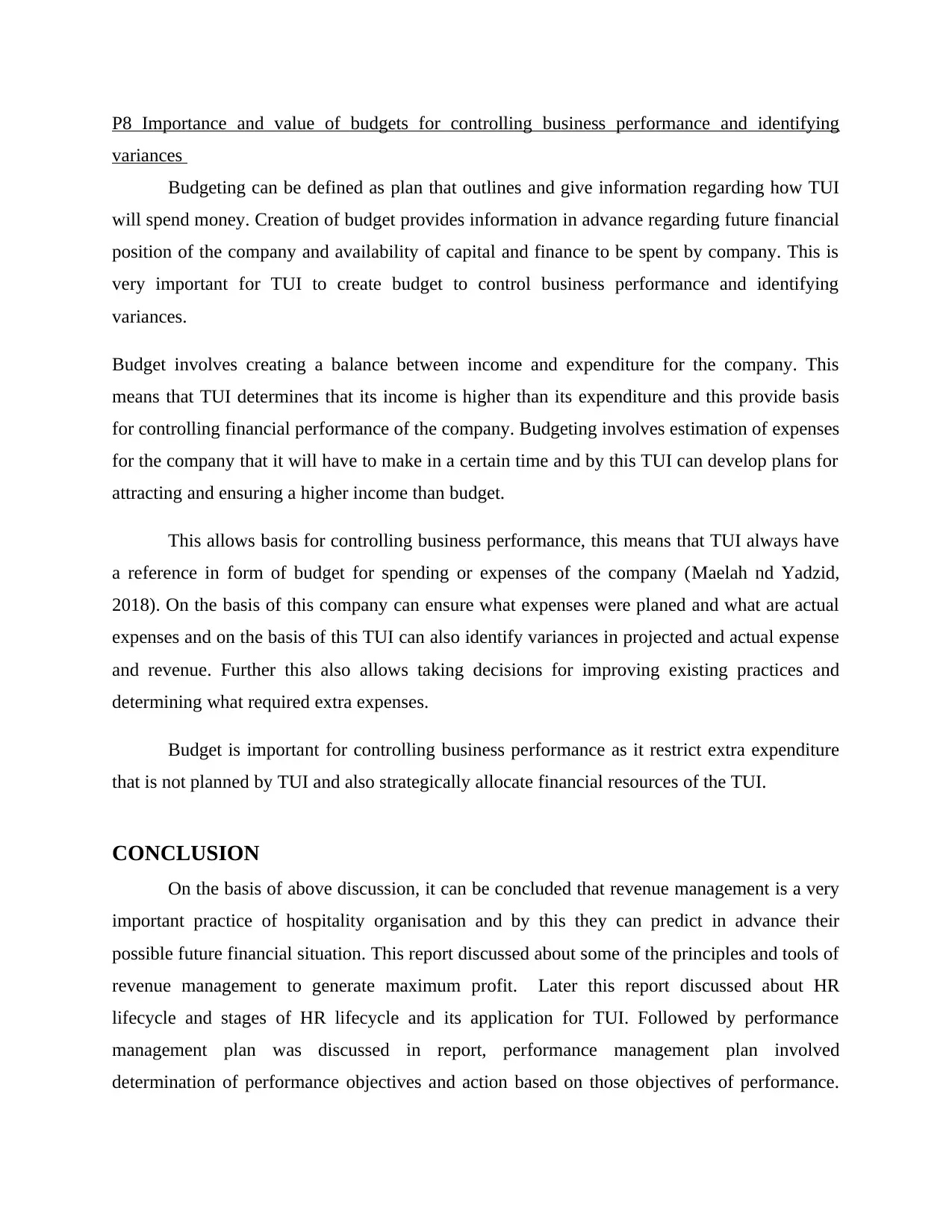
P8 Importance and value of budgets for controlling business performance and identifying
variances
Budgeting can be defined as plan that outlines and give information regarding how TUI
will spend money. Creation of budget provides information in advance regarding future financial
position of the company and availability of capital and finance to be spent by company. This is
very important for TUI to create budget to control business performance and identifying
variances.
Budget involves creating a balance between income and expenditure for the company. This
means that TUI determines that its income is higher than its expenditure and this provide basis
for controlling financial performance of the company. Budgeting involves estimation of expenses
for the company that it will have to make in a certain time and by this TUI can develop plans for
attracting and ensuring a higher income than budget.
This allows basis for controlling business performance, this means that TUI always have
a reference in form of budget for spending or expenses of the company (Maelah nd Yadzid,
2018). On the basis of this company can ensure what expenses were planed and what are actual
expenses and on the basis of this TUI can also identify variances in projected and actual expense
and revenue. Further this also allows taking decisions for improving existing practices and
determining what required extra expenses.
Budget is important for controlling business performance as it restrict extra expenditure
that is not planned by TUI and also strategically allocate financial resources of the TUI.
CONCLUSION
On the basis of above discussion, it can be concluded that revenue management is a very
important practice of hospitality organisation and by this they can predict in advance their
possible future financial situation. This report discussed about some of the principles and tools of
revenue management to generate maximum profit. Later this report discussed about HR
lifecycle and stages of HR lifecycle and its application for TUI. Followed by performance
management plan was discussed in report, performance management plan involved
determination of performance objectives and action based on those objectives of performance.
variances
Budgeting can be defined as plan that outlines and give information regarding how TUI
will spend money. Creation of budget provides information in advance regarding future financial
position of the company and availability of capital and finance to be spent by company. This is
very important for TUI to create budget to control business performance and identifying
variances.
Budget involves creating a balance between income and expenditure for the company. This
means that TUI determines that its income is higher than its expenditure and this provide basis
for controlling financial performance of the company. Budgeting involves estimation of expenses
for the company that it will have to make in a certain time and by this TUI can develop plans for
attracting and ensuring a higher income than budget.
This allows basis for controlling business performance, this means that TUI always have
a reference in form of budget for spending or expenses of the company (Maelah nd Yadzid,
2018). On the basis of this company can ensure what expenses were planed and what are actual
expenses and on the basis of this TUI can also identify variances in projected and actual expense
and revenue. Further this also allows taking decisions for improving existing practices and
determining what required extra expenses.
Budget is important for controlling business performance as it restrict extra expenditure
that is not planned by TUI and also strategically allocate financial resources of the TUI.
CONCLUSION
On the basis of above discussion, it can be concluded that revenue management is a very
important practice of hospitality organisation and by this they can predict in advance their
possible future financial situation. This report discussed about some of the principles and tools of
revenue management to generate maximum profit. Later this report discussed about HR
lifecycle and stages of HR lifecycle and its application for TUI. Followed by performance
management plan was discussed in report, performance management plan involved
determination of performance objectives and action based on those objectives of performance.
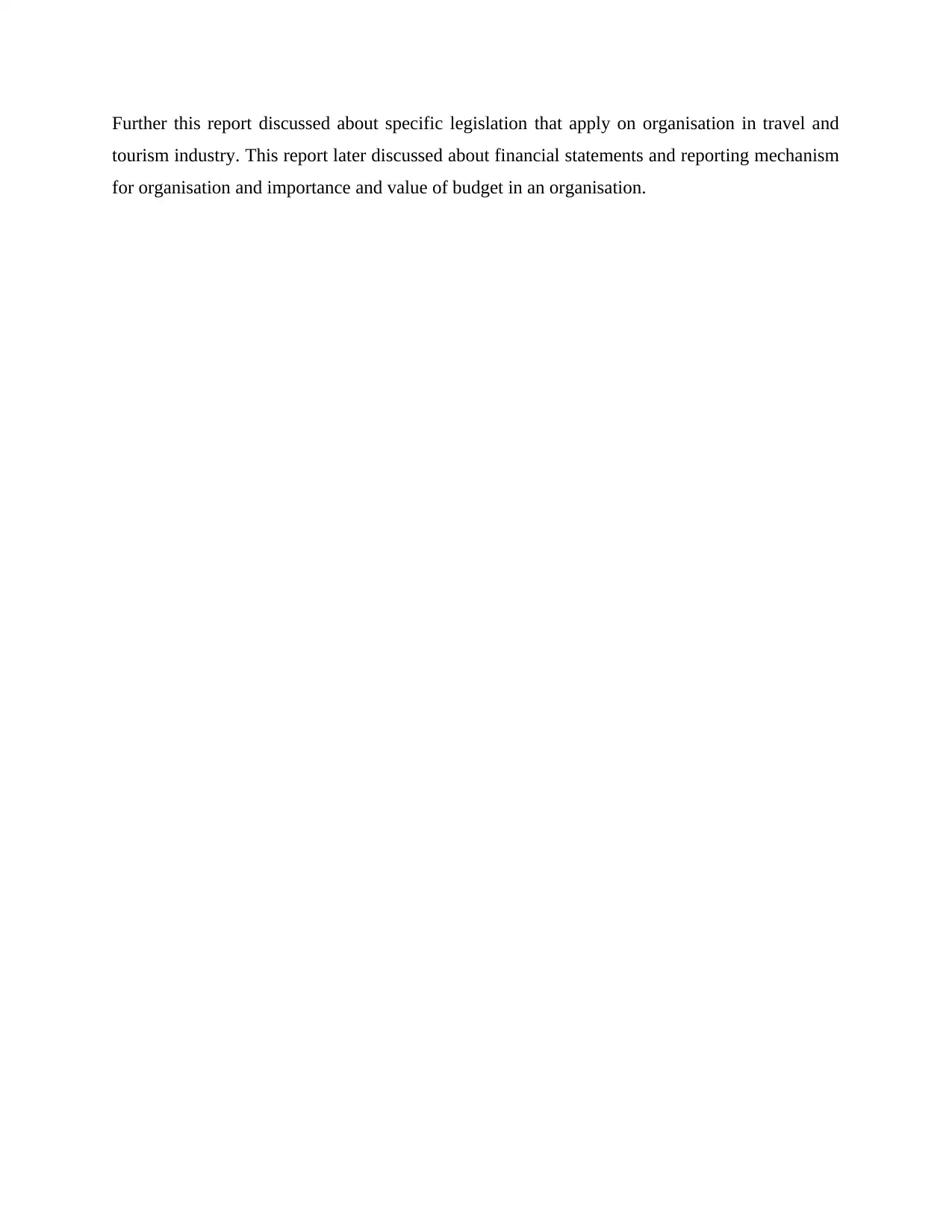
Further this report discussed about specific legislation that apply on organisation in travel and
tourism industry. This report later discussed about financial statements and reporting mechanism
for organisation and importance and value of budget in an organisation.
tourism industry. This report later discussed about financial statements and reporting mechanism
for organisation and importance and value of budget in an organisation.
⊘ This is a preview!⊘
Do you want full access?
Subscribe today to unlock all pages.

Trusted by 1+ million students worldwide
1 out of 14
Related Documents
Your All-in-One AI-Powered Toolkit for Academic Success.
+13062052269
info@desklib.com
Available 24*7 on WhatsApp / Email
![[object Object]](/_next/static/media/star-bottom.7253800d.svg)
Unlock your academic potential
Copyright © 2020–2026 A2Z Services. All Rights Reserved. Developed and managed by ZUCOL.





